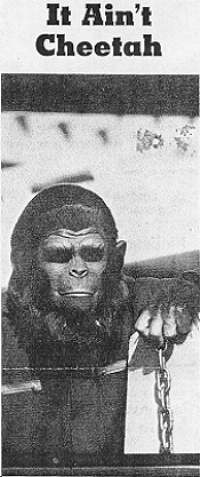| TV MIKE JAHN
|
|

Something less than two years ago I spoke with Paul Williams, the pop singer, who was filled with stories of the wonder of his first major acting assignment: playing an orangutan in the film "Battle for the Planet of the Apes." |
One day recently, Mr. McDowall was preparing for shooting. "Itís hard to say how itís going," he said. "It isnít like doing a film which you finish, look at, and then have a point of view about. With a TV series youíre working so hard and itís being shown at the same time. Itís a rather different situation from anything Iíve been involved with before. We just started the 11th episode this week, and have 13 more to do to complete the season. Itís very pleasant. The people are very nice, but itís hard work." What precisely makes "Planet of the Apes" hard work? "Itís a very challenging acting assignment," Mr. McDowall said. "The physicalization is different, because you are dealing somewhat with animal movements. And itís not easy being encased in all that rubber for that length of time and manipulating it so that itís alive." How long must the actor remain in costume? "I work four days a week," he explained. "Three hours for makeup. After the first hour and a half, before the chin is put on, I eat breakfast. Then I donít get any more solid food until the makeup is off, usually 12 hours later. "When we started shooting in June, it was boiling. Even now itís still pretty hot. You perspire, and that breaks the glue. I have an air-conditioned motor home which I run into between takes." The basic principle of the show is that humans nearly destroyed themselves through technology; the apes evolved into the dominant species, and they keep the few remaining and slightly dull-witted humans in a position of servitude. There is a lot of playfulness, such as having an ape speculate about what would happen if you chained an infinite number of humans to an infinite number of typewriters. (Incidentally, that experiment has been tried, and the result goes by the name of "The Village Voice.") Mr. McDowall says that despite the Darwinian implications, there has been no rumbling from the Bible Belt. "Even in the movies I donít remember any sort of uproar about that," he says. The "Planet of the Apes" phenomenon sells not only movies and TV shows, but more than 300 different kinds of items, including toys, games, dolls, books, wastebaskets, t-shirts, doll cut-out books, bubble gum, saucers and plates, transistor radios, and masks, some of them running to $60. According to Selwyn Rausch, a New York merchandiser who is responsible for this aspect of the "Apes" craze, "by the end of this year we estimate $100-million gross sales in all kinds of ĎApeí-related merchandise. "Why anyone would want a ĎPlanet of the Apesí wastebasket I donít know," he says, "but theyíre selling like crazy."
|
|
CUE November 18-24, 1974 Reprinted with permission from the author Visit Mike Jahn's Homepage |
|